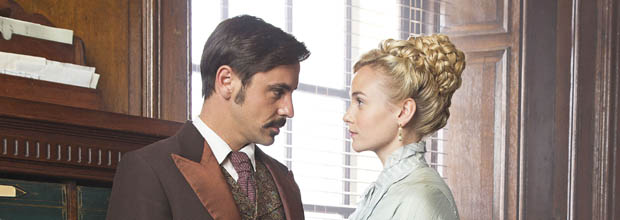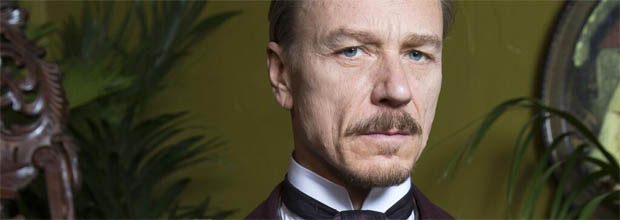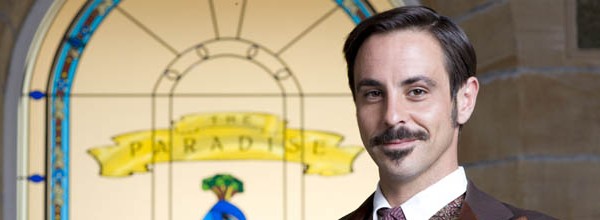Serues 2 concluded at the end of last year, but the BBC has now confirmed that the show won’t be returning for a third series.
> Buy the complete Series 1-2 boxset on Amazon.
What was it that attracted you to the role of John Moray in The Paradise?
“I think it was good scripts. The producer sent me episodes one and two of the first series before I decided to jump on board, and I just loved Bill Gallagher’s scripts to be honest.
“It was set in this incredibly romantic period in time, the 1870s, and it was based on an Emile Zola novel, so it was a number of things. As well as the fact that it was this meaty leading part in a BBC period drama. Of anything I’ve been a part of and enjoyed watching, it always started with good scripts, so I’d have to say it started then.”
Was it fun working with Bill Gallagher on the series, given his success in adapting Lark Rise To Candleford for the BBC?
“It was, Bill is such a lovely chap. He is so down to earth, encouraging and easy to work with. He actually came in and directed an episode as well, and he was just brilliant. He cares as much about the story as we do, and was able to come in and hit all the beats.
“It was nice to be working with a director who helped form the dialogue. Considering he has only directed a few times, he had this lovely sensitivity and simplicity in his direction, so yeah, he was always very encouraging. Bill’s not only a good writer but a good friend.”
Looking at Moray as a character, he had this wonderful character arc over the two series. Are you pleased that your character had such depth and movement?
“Oh yeah, of course. Every actor wants to play meaty parts, no matter what they say, and it was lovely to step in and be able to make an impact. For me, it was a great opportunity.
“The great thing about television, especially drama, we were given sixteen hours to explore this character and develop little details and track your journey. I love the fact I was given a character with a chance to breathe, organically, and create as much detail and layer as I possibly could. It’s a gift for any actor.”
You’re also very well known for your theatre work, particularly Black Watch. Did theatre help you prepare for the role, given that theatre is a sort of heightened reality, much like The Paradise?
“It is helpful, but it’s hard to put your finger on it sometimes. I don’t know if I’m a passive learner but I do tend to learn retrospectively. Black Watch certainly opened a lot of doors for me, so because a lot of people saw it, more people were happy to see me for whatever they were casting on the back of it. It did give me experience of working in an ensemble.
“The Paradise has its major and its minor characters but again in an ensemble, so it was more a lesson of working in a team.”

There was a similarity drawn between The Paradise and Mr Selfridge. Where would you say The Paradise is different from its ITV counterpart?
“It’s a hard one for me to answer, as I haven’t actually seen Mr Selfridge. I heard it was a great show, but I can’t comment on how it’s different, because I haven’t seen it so I’d just be guessing. My girlfriend has though, and she loves it so, I feel a bit… betrayed, in the lightest sense of the word!”
The Paradise sets itself out to be very different from other period dramas in regards to the themes, storylines, as well as adapting aspects of the original Emile Zola novel La Bonheur Des Dames into a British setting. Was a major part of the appeal that it had more meat and deeper themes within the story?
“Absolutely. If it had been a typical melodrama without any of the feminist or heavier themes that are in the novel, then it would have moved too far away from the source material. The novel, for me, remained a great starting point and allowed us to pull out details that weren’t even in the script.
“The Paradise works though because one level it has this lighter landscape where everything is superficially wonderful, but beyond that there’s this edgier, serious, more contemporary feel. You can really feel that pulse beating, I think.”
Focusing on Series 2, did the gap and jump ahead in the story provide you with a good starting point to enter the new series or would you have preferred to start things where they left off?
“I think it was really nice to be able to dive into the idea that its a year later, and I think what’s great is when series one ended, I think we all knew what would happen immediately after that, that things were going to get a bit sticky for Moray. The idea that they’ve left that year to the audience’s imagination allows it to have a thread of ambiguity.
“I think, as a technique to get the audience thinking and promote a response I think it was extremely clever. The audience are smart enough to piece things together. It’s now just a case of moving forward with the story.”
Many responded well to the love triangle between John, Denise and Katherine. Were you surprised by the response you got regarding that central relationship?
“You kind of don’t know what to expect, to be honest. You just hope that your instinct has led you to the right place, and that that’s enough. I think the fact that Denise and Moray got such a good response, that people enjoyed watching that couple onscreen and really believed in the chemistry and the romance and really wanted them to get together proves its success. At the time, Jo Vanderham and I just tried to play the scenes as best we could.”
You share a lovely chemistry with Joanna Vanderham, who plays Denise. What was she like to work with?
“Jo’s lovely, she’s a good friend. She’s a really savvy young actress as well. She’s 22 and you’ve got to be quite clever, not just in terms of what you decide to take on but how you decide to play it. She’s intelligent and very professional, yet maintains this edge of mischief and fun, and I couldn’t ask for anything more. She’ll have a great career ahead of her, I’m sure.”

And what was it like working with Ben Daniels? The characters relationship with Moray was a tense highlight for many.
“Ben’s a terrific actor and he brought serious weight to the second series. He’s hugely experienced as well, and knows just how to turn it on in the moment because he’s such a pro. He’s also one of the funniest actors I’ve ever met; he’s completely self-deprecating and mischievous. It encouraged the rest of us to raise our game to match what he was doing.”
Do you have any fond memories of your time on the show?
“Hundreds, literally. It would be hard to choose them, to be honest. Ten months working on that show every day. It was such a great experience. The main thing I’m taking away with me is that feeling of camaraderie; it’s such a lovely cast. It’s not often you go into a job and come out with friends, but with The Paradise I now have these lasting friendships. It was just brilliant fun.”
You’re also really well known for playing Richie in Threesome. Is comedy something you’d like to continue with?
“Absolutely. Now would probably be a good time to do some more comedy, off the back of The Paradise, I think it’s essential to surprise the audience. Just to keep things fresh and, for me, not to be typecast, which I’ve managed to avoid so far in my career. It’s lovely to allow myself to be versatile as an actor.
“Comedy is so worthwhile but so difficult to gauge, but I’d love to do more. Threesome was this special relationship and when your job is to go to work and make each other laugh, there’s nothing more enjoyable. I’d do another comedy if it came along and Threesome was such a great experience.”
> Buy the complete Series 1-2 boxset on Amazon.
Watch the Series 2 trailer…
What was your favourite moment in The Paradise? Let us know below…

